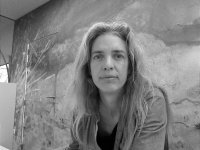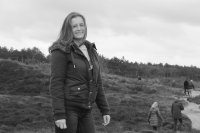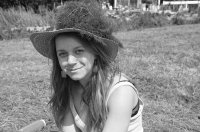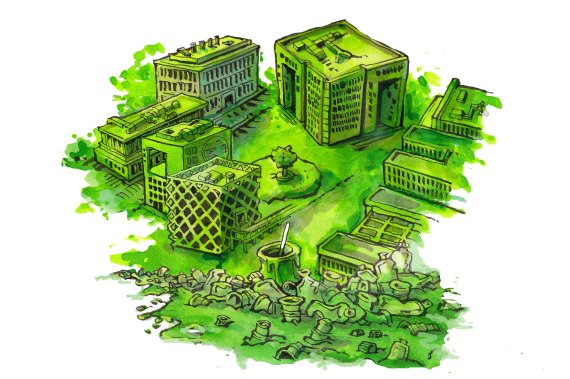text Albert Sikkema, Luuk Zegers and Coretta Jongeling illustration Henk van Ruitenbeek

Clara de Mik
Receptionist at Gaia/Lumen
‘Discouraging cars on campus. There are more and more of them, and some of the drivers could come by public transport or by bike. I live in Arnhem myself. If I have to start very early in the morning, I come by car. If I’m starting later, I take the train. The campus is very accessible by public transport. I’m glad WUR stimulates cycling with speed pedelecs and WUR bikes, but more could be done to discourage travel by car. WUR could raise the travel allowance for public transport, for instance. Public transport is more expensive than coming by car.’

Arjan Breugem
Soil Physics and Land Management researcher
‘Sort waste more and better. I still too often see all kinds of stuff dumped in the same bins – paper and even food in the bin for non-recyclable waste, for instance. Even outdoors on campus, I often see litter like plastic, paper and tins lying on the ground. That is annoying and bad for the environment. What should we do? Point out to people what they are responsible for. Knowledge, awareness and willingness are very important, I think. Surely the campus is full of educated people who want to protect the environment? Come on then!’

Tessa LouwerensResource
editor
‘Make the expense claims system more user-friendly. When I hear my colleagues grumbling and groaning, I think I’m not the only one who thinks this. For every little sum you claim, you have to get the receipt printed, if it’s digital, and signed. Then you have to scan it in and make sure it’s uploaded in the right format. It’s partly a question of trust: I think the signature is just to make sure you only submit a receipt once. And then there are people in the finance department checking all this. My guess is that this system costs more time and money that it saves.’

Marlies KoertsMSc student of Food Technology
‘The university is currently running campaigns on learning to cope with stress (Surf Your Stress) and get enough exercise (Sit Less, Feel Better). In other words: we are supposed to take good care of ourselves. But at the same time, WUR is making that more and more difficult with the Bring Your Own Device policy, which means there are less work stations with computers and students have to work on their laptops, often at non-adjustable tables and chairs. That makes you adopt a poor working posture and increases the risk of RSI. There is a shortage of space anyway: there is no hope of finding a place in the library after eight o’clock in the morning. In short: in 2020, WUR should invest in good work stations. And put adjustable tables and chairs in classrooms. And make more information available about good working posture.’

Karin Schroen
Personal professor of Food Process Engineering
‘We should have more interaction between scientific disciplines. At WUR we certainly have the knowledge to contribute to several of the Sustainable Development Goals, but at the moment we don’t bring it all together enough. PhD students and their supervisors are too much on their own little islands. A missed opportunity. Dare to explore the fundamental side of your subject if you are an applied scientist, and to find out which applications you might support if you are a fundamental researcher. My proposal is an Open Science Forum, where you present subjects from different perspectives. Then WUR could produce talented researchers who really contribute something, dig deeper and are capable of talking to various different disciplines. I want to organize the first get-together on nanotech and nutrition. After that, it’s up to PhD students to take it further, as far as I’m concerned. The new Dialogue Centre offers scope for it.’

Pablo Vanneste
MSc student of Organic Agriculture
‘WUR should now finally give organic agriculture pride of place in its research fields. It is a bit strange to be the most sustainable university in the world and yet to allocate less than a quarter of all your research fields to use for organic farming. I have often heard that WUR does research on making conventional farming more sustainable, but perhaps it’s time to go a step further than that. Why should we stop at organic, and not start looking at more stable production systems as an alternative to always using annual plants? A good New Year’s resolution for WUR would be to expand the area used for food forests from one to 10 hectares. That would be perfectly possible on the fields opposite the campus.’

Xanthe VerschuurMSc student of Forest and Nature conservation
‘WUR should now finally stop expanding the campus. The new plan to build on Born-Oost, the green area next to the campus, is a shame. A green university should be the first to see the importance of nature around a city. I understand that innovation is needed sometimes, but the university could do more to repurpose existing buildings, such as those at the old Dreijen campus, the business park or in the Nude neighbourhood. Many companies that want to move onto the campus already have offices at other locations, which are now empty. It would be good to give some thought to the growth of the university. There is a shortage of accommodation already, and not just for students but for other Wageningen residents too.’

